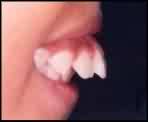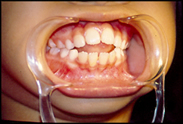Overview
|
Sucking on thumbs is healthy and normal in infancy. Most children stop the habit between 2 and 4 years of age. |
 |
When does it become a problem?
Thumb sucking becomes a problem if it continues beyond the time that permanent front teeth erupt.
What are the complications?
Excessive thumb sucking may lead to :
-
- Protrusion of the upper front teeth

- Protrusion of the upper front teeth
- Bite problems

Open bite – teeth cannot be closed together
How do you stop this?
Some tips to help your child give up sucking his thumb/fingers.
- Bandage the thumb. This changes the character of the finger sufficient to call the child?s attention to the fact that it is being placed in the mouth.
- Apply a distasteful agent e.g. quinine or pepper on the thumb. Such things have been used to make the thumb or fingers so distasteful that the child will keep them out of the mouth.
- Give him lots of praise, rewards and attention when he is not sucking his thumb.
- Keep his mouth busy by singing a song or playing a musical instrument.
- Keep his hand occupied e.g. with a toy.
- Older children will respond to explanation and encouragement of the effect of sucking on the teeth.
- Seek professional advice if the habit persists after the permanent front teeth erupt (7 – 8 years old).
| Last reviewed | : | 20 April 2012 |
| Writer | : | Dr. Che Noor Aini bt. Che Omar |
| Accreditor | : | Dr. Chew Yoke Yuen |
| Reviewer | : | Dr. Laila bt. Abd Jalil |







